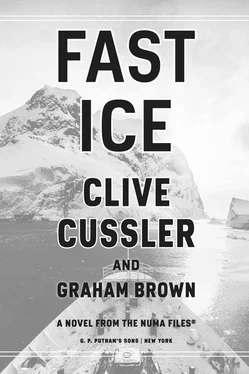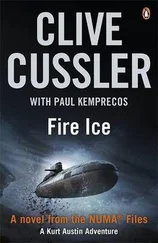Gamay looked through the personnel file for anything relating to the crash. Eventually, she found an “action verdict” that reappointed him to flight status. The report had been signed by a Luftwaffe Colonel in Hamburg. It read
Captain Jurgenson could not have been expected to know the peril of the rapid icing agent present in the lake upon which he landed. His exemplary flight skills not only saved himself but his entire crew. Reinstatement to active flight status is effective immediately.
“He did crash,” Gamay said.
Paul had discovered a map, drawn by the Bremerhaven ’s commanding officer. Long, thin sections were marked in red and numbered. They looked like flight plans to Paul, out and back from the Bremerhaven ’s position.
“Eins, zwei, drei, vier, fünf,” Paul said, doing his best to pronounce the German numbers. “If Jurgenson’s plane crashed on flight number four, this would have been his planned flight path.”
The long outbound flight covered five hundred miles of territory. A thirty-mile crosswind turn took them east, before another long leg brought them back to ship’s position. “That’s still fifteen thousand square miles,” Paul said.
“Better than half a million,” Gamay replied. “Which is what the Schwabenland expedition covered.”
“It’s not a bull’s-eye,” Paul said. “But it’s a start. All thanks to our friend Jurgenson. Whatever happened to him anyway?”
Gamay returned to his personnel file, summarizing aloud as she went. “He was discharged prior to the start of the war. He was then reactivated for duty in December of 1942.”
“Total war,” Paul said. “On two fronts at the same time. At some point, the Nazis began running low on pilots, soldiers and everything else.”
“Except he wasn’t assigned to fly,” Gamay said. “When I look at his personnel record, he was assigned directly to the SS itself.”
Paul’s eyebrows knitted together. “You’re kidding me?”
She read the orders. “Captain Jurgenson reinstated to military service and promoted to rank of Major, concurrent with responsibilities required by Alpine Unit, Schutzstaffel.”
“Drafted and promoted,” Paul said. “Interesting.”
Gamay continued. “His initial post was to the Norsk Hydro plant in Norway.”
“Norsk Hydro was the Nazi heavy water manufacturing facility,” Paul said. “The British blew it up, concerned that the Nazis were on track to building an atomic bomb.”
“He was there only a few weeks,” Gamay said. “His later assignment took him farther up the peninsula, to the top of Norway, above the Arctic Circle. That was his last posting. He was killed during an attack by Norwegian resistance members two months after arriving.”
Paul frowned. “A sad end for a man who clearly never wanted to be a Nazi. What was he working on?”
Gamay paused. There was a code name connected to his assignment, but the computer program hadn’t come up with a direct English translation. She clicked on the menu and then tapped the option that asked the computer to guess.
A little hourglass appeared on the screen. It flipped over several times before vanishing just as the answer appeared.
“He was assigned to a project known as . . . Fast Ice.”
31
NUMA HEADQUARTERS
Rudi Gunn found himself in NUMA’s latest teleconference room. Arranged in a triangular shape, it had a table at the back wall and a pair of jumbo-sized screens along the other two sides.
Sitting at the conference table, Rudi could converse with NUMA personnel all around the world and it would feel as if they were sitting in the same room.
After initially dismissing the idea as a waste of money, Rudi had come to embrace the setup. Seeing his teams live and up close gave him a chance to make eye contact, a chance to study their body language and read the expressions on their faces.
At the current moment, Kurt and Joe graced one screen while the Trouts appeared in high definition on the other.
Paul and Gamay were easy to read. A sense of quiet triumph came from their screen. On the other side, Joe was like the kid who couldn’t wait to get out of class, fidgeting in his seat, and building a structure with Post-its and paper clips just to pass the time.
Kurt was the outlier and a study in quiet intensity. He was calm and relaxed, but the set of his jaw told Rudi he was coiled like a steel spring, ready to get back into the fight, a fight that was a long way from over.
Gamay proudly summed up what she and Paul had learned in Berlin, finishing on a down note. “Unfortunately, there’s no information on the nature of the Fast Ice project.”
“That’s not quite true,” Rudi said.
On-screen, Kurt leaned forward as if he hadn’t heard right. “I thought you said Hiram’s computers had come up empty?”
“They did,” Rudi insisted. “But someone else has succeeded where all our technology failed.”
Rudi turned in his chair and pointed to the man sitting beside him.
St. Julien Perlmutter was immense in size and nattily dressed. Weighing in at almost four hundred pounds, Perlmutter was an unapologetic fan of fine dining and a connoisseur of the best wines, bourbons and cognacs. More importantly, he was a superb historian and a collector of all things nautical, with a near-photographic memory.
Perlmutter had an extensive library in his home. Or, more accurately, had turned his sprawling home into a storehouse of old books. Thousands of rare volumes filled the structure, stored here and there in every possible nook and cranny. They competed for space with old charts, hand-drawn maps, nautical diaries and stack upon stack of ships’ logs. The vast majority remained where he placed them, arranged in an order only he could ever recall or understand.
Many of his volumes were one-offs or the last-known versions of their kind. If a fire ever took down St. Julien’s house, the world would lose a treasure trove it never knew it had.
“St. Julien,” Kurt announced. “Good to see you. Forget what they say about the cameras, this one hasn’t added a single pound to your svelte frame.”
St. Julien grinned. “Nor has it darkened your overgrown and graying hair. Shouldn’t you be applying for Social Security by now?”
“I’d take it if they offered,” Kurt said.
St. Julien loved to joke and he appreciated getting it back in return, especially from his closest friends, of whom Kurt was one.
Rudi intervened to prevent the two of them from trying to one-up each other. “If you would, St. Julien.”
“Without delay,” Perlmutter said. He began to speak, enunciating his words in the jovial voice of a man who enjoyed the spotlight. “Hiram’s computers couldn’t find any record of the Fast Ice project for the same reason you’ve never heard of it, my boy. Because almost no one knows of its existence.”
“Aside from you,” Kurt said.
“And very few others,” Perlmutter said. “We can assume the Nazis destroyed all record of it. Or perhaps there were few made in the first place. I only know of it by chance as I have in my collection the unpublished diary of a Nazi U-boat captain who was assigned to the venture. I won’t be specific about his written description—it would be impolite, considering the choice words he used—but I will say this. The Germans can swear with the best of them.”
On the wall-sized screens, Paul and Gamay laughed.
Joe broke into a broad smile. “A skipper who didn’t like the orders from the high command. Who ever heard of such a thing?”
“Even the Nazis thought their superiors were Dummkopfs ,” Perlmutter announced.
“What was this U-boat captain so all fired up about?” Kurt asked.
Читать дальше












